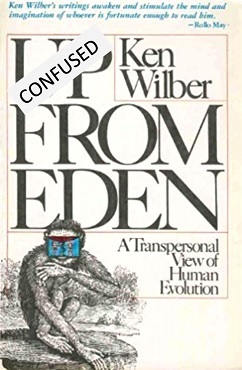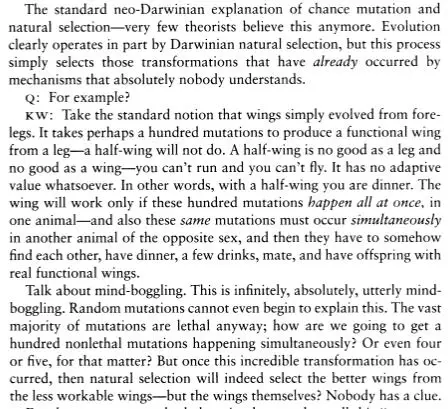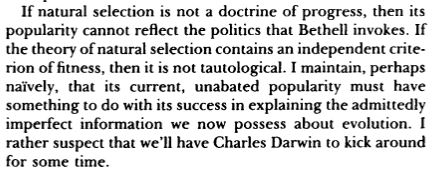|
TRANSLATE THIS ARTICLE
Integral World: Exploring Theories of Everything
An independent forum for a critical discussion of the integral philosophy of Ken Wilber
 David Christopher Lane David Christopher Lane, Ph.D.
Professor of Philosophy, Mt. San Antonio College Lecturer in Religious Studies, California State University, Long Beach Author of Exposing Cults: When the Skeptical Mind Confronts the Mystical (New York and London: Garland Publishers, 1994) and The Radhasoami Tradition: A Critical History of Guru Succession (New York and London: Garland Publishers, 1992). SEE MORE ESSAYS WRITTEN BY DAVID LANE
In his 175th contribution to Integral World David Lane returns to "Up from Eden", a book he "dearly loved" when he first read it until he got second thoughts when he read what Wilber had to say about Charles Darwin. Lane's skeptical spirit has been a lasting inspiration for my own work. Thanks Dave! (FV)
CONFUSED FROM EDEN
From the Very Start Ken Wilber
Misunderstood Darwinian Evolution
David Lane
How does introducing “Eros” or “Atman telos” or “Spirit” in any way make evolution more intelligible? It doesn't.
I am currently staying a block away from the University of California, Berkeley, visiting my oldest son, Shaun, who is a sophomore studying computer science. I am doing research on a new edition on the history of the Radhasoami movement for Oxford University Press. However, because of my fondness for bookstores, I often take walks around Telegraph and Shattuck avenues to see what the various bookstores (from Moe's to University Press Books to Pegasus') have on offer. When I attended the Graduate Theological Union back in 1979 my favorite haunts were Cody's and Shambhala, but they have since gone out of business.

Two days ago, at the Half Price Bookstore on Shattuck I happened upon a first edition copy of Ken Wilber's 1981 tome, Up From Eden[1], a text I dearly loved when I first read it and which I immediately incorporated into a course I was giving in psychology at the time. I was a fan of Wilber's work almost from the beginning, but what sealed the deal for me was when I read The Atman Project and his article in ReVision entitled “Eye to Eye.”
Although I was conversant with Darwinian evolution and the modern synthesis, I only had a cursory understanding of its implications. Later when I was securing my Ph.D. at the University of California, San Diego in the 1980s I became much better acquainted with the subject and began reading Darwin and Wallace directly along with such modern proponents as Edward O. Wilson, Ernst Mayr, Stephen Jay Gould, Richard Dawkins, George C. Williams, and Theodosius Dobzhansky, among others. It radically transformed my understanding of natural selection and what it portended. Daniel Dennett in his remarkably readable texts, Darwin's Dangerous Idea and Intuition Pumps and Other Tools for Thinking, rightly summarized why a biological understanding of human development is so important when he wrote,
“Darwinian thinking does live up to its billing as universal acid: it turns the whole traditional world upside down, challenging the top-down image of designs flowing from that genius of geniuses, the Intelligent Designer, and replacing it with the bubble-up image of mindless, motiveless cyclical processes churning out ever-more robust combinations until they start replicating on their own, speeding up the design process by reusing all the best bits over and over. Some of these earliest offspring eventually join forces (one major crane, symbiosis), which leads to multicellularity (another major crane), which leads to the more effective exploration vehicles made possible by sexual reproduction (another major crane), which eventually leads in one species to language and cultural evolution (cranes again), which provide the medium for literature and science and engineering, the latest cranes to emerge, which in turn permits us to “go meta” in a way no other life form can do, reflecting in many ways on who and what we are and how we got here, modeling these processes in plays and novels, theories and computer simulations, and ever-more thinking tools to add to our impressive toolbox.
This perspective is so widely unifying and at the same time so generous with detailed insights that one might say it's a power tool, all on its own. Those who are still strangely repelled by Darwinian thinking must consider the likelihood that if they try to go it alone with only the hand tools of tradition, they will find themselves laboring far from the cutting edge of research on important phenomena as diverse as epidemics and epistemology, biofuels and brain architecture, molecular genetics, music, and morality.” (Intuition Pumps and Other Tools for Thinking, p. 277)
In many of the courses I taught in the 1990s/2000s both at the undergraduate and graduate levels (from UCSD to CSPP to MSAC to CSULB, etc.) I made several of Ken Wilber's books required reading. However, one day in class we were reading aloud from A Brief History of Everything which Wilber had just published (circa 1996). Going through early sections in the book my class (and particularly myself) were wonderstruck when we came upon passages that clearly showed that Ken Wilber had not only misunderstood Darwinian evolution but had maligned and completely misrepresented the field of molecular and evolutionary biology in the process. I recall, and to the bemused laughter of my students, saying aloud, “What the f….?”

Ken Wilber, A Brief History of Everything, p. 20 (2nd edition, 2001)
Right there and then I decided that it was time for me to finally address a problem I had noticed in Wilber's writings earlier on. He is an exaggerator par excellence. Indeed, the subtitle of my very rushed series at the time reveals in a nutshell his problem, “The Art of Spiritual Hyperbole.” I was so mesmerized by Wilber's concepts of pre/trans fallacy, legitimacy/authenticity, and the hierarchical structure of consciousness, that I had unconscionably overlooked his underlying metaphysical antipathy to Darwin's core discovery: complexity can arise without a conscious design/er.
Thankfully, Frank Visser through a series of well researched and well-argued essays has been at the forefront in systematically pointing out the fundamental errors Ken Wilber has made in his continued bastardization of science to serve his Integral agenda. That Wilber has not spent serious time addressing these flaws in his patchwork is not only troublesome but speaks volumes about his so-called intellectual “integrity.”
I like Ken Wilber and I have enjoyed many of his books, but it is beyond egregious that he hasn't addressed the gaping evolutionary hole in his theory. I would love to see him directly engage those most involved in the field, especially acerbic critics such as Jerry Coyne and Daniel Dennett. Tackle these thinkers directly, Ken, and let's see who emerges relatively unscathed after this cerebral and textual rumble. Perhaps much will be learned that will make the Integral quilt stronger. But failing to address Visser's many criticisms doesn't bode well for making progress in a field so desperately in need of it.
‘I am not going to argue the point’
All of this, however, is merely a backdrop to what happened two days ago when I chanced upon that first edition copy of Up From Eden. Although I have read this book several times before, I hadn't really focused on Wilber's take on Darwin and evolution. I had somewhat glossed over those brief sections. This time, however, I had an “aha” moment, realizing that Wilber's misinformed view on evolution started right at the beginning of his career. On pages 304 and 305, he reveals his hubris when he writes,
“I am not going to argue the point [which, by the way, is precisely what he should do at this point but doesn't], but take it as a plainly obvious that 'natural selection' per se cannot account for that process [higher order emergence]. Natural selection can account, at best, for the survival of present wholes, not their transcendence into higher-level wholes. To the average biologist this sounds shocking, but the conclusion, of those whose specific field is the theory of scientific knowledge is straightforward, 'Darwin's theory . . . is on the verge of collapse. . . He is in the process of being discarded, but perhaps in deference to the venerable old gentleman, resting comfortably in Westminster Abbey next to Isaac Newton, it is being done as discreetly and gently as possible, with a minimum of publicity.' The point, in a phrase, is that the orthodox scientific theory of evolution seems correct on the what of evolution, but it is profoundly reductionistic and/contradictory on the how (and why) of evolution.”
It is both highly illuminating and instructive to parse Wilber's words and phrases in the previous excerpt since they reveal in nutshell how truly misinformed he is about Darwin and evolution.
- First, and perhaps most tellingly, Wilber confesses that he is not going to argue the point about what natural selection can bring forth, despite that his whole book is trying to turn Darwin's theory upside down. Right at this juncture, Wilber should be arguing with molecular biology, but instead lamely skips over it, pretending to the reader that it isn't worth further discussion.
- Second, Wilber doesn't understand the very basis of Darwin's most famous tome, On the Origin of Species, since it was focused on exactly how higher order emergence can happen over time (from variation + inheritance + selection + time = design) without invoking “Atman telos itself” (a curiously Hindu phrase of Wiber's own making). Indeed, the revolutionary nature of Darwin's thought is precisely because it can explain how simpler organisms become more complex over time, yet Wilber thinks that evolution without “involution” doesn't make sense, since he believes it is about putting things back together where in his convoluted view “anamnesis and holism are actually the same thing.”
- Third, notice Wilber's not subtle put down of those “average” biologists who are still under the mistaken impression that Darwin's theory is still viable. Apparently they didn't get the latest Wilber memo in time where “those whose specific field is the theory of scientific knowledge” know that evolution by natural selection is going to be “discarded.”

How then does he support such an all-encompassing claim? He provides a quote that, according to his end notes he got from Huston Smith's Forgotten Truth, neglecting to tell his literate audience that Smith is a religious studies scholar not a scientist trained in evolutionary biology. Yet, the quote doesn't come from Huston Smith at all. Rather Smith quoted it from Tom Bethell, an American journalist (though born and educated in England), who would later gain notoriety for “denying that HIV caused AIDS, global warming, and promoting intelligent design.” And in what scientific journal did Bethell publish his screed? Harper's Magazine.[2]
Wilber shows his intellectual laziness by cribbing a quote from Smith which didn't originate with him but from a journalist whose credentials are questionable at best. And, to add insult to injury, the contumelious quote from Tom Bethell, which Wilber used to undermine a critical discussion of what natural selection can actually bring forth was repudiated (that same year) by the late Harvard Professor, Stephen Jay Gould, in an essay for Natural History entitled “Untimely Burial.”[3]

Stephen Jay Gould, Ever Since Darwin, p. 45. (Reprinted 1992)
Gould didn't buy Bethell's argument, nor (contrary to Wilber's hasty generalization) do the vast majority of evolutionists who actually work in the field and who are not journalists, religious studies scholars, or Adi Da influenced New Age thinkers.
Wilber doesn't seem to get what Darwin had achieved since he argues hastily and confusingly that,
“The point in a phrase, is that the orthodox scientific theory of evolution seems correct on the what [his emphasis] of evolution, but is profoundly reductionistic and/or contradictory on how (and why) of evolution.”
In just one sentence, Wilber reveals how wrong he is about Darwin and what he accomplished. Darwin does show the how and why of evolution since that was his and Wallace's great breakthrough. Natural and sexual selection is the means by which change occurs and why simpler forms can become more complex over time and appeared to have been designed, despite the absence of any Creator. The idea of evolution has been around for centuries, but what was not understood was precisely how species mutated over time.
That (not the what, as Wilber lamely suggests) was Darwin's and Wallace's singular contribution. Because of this we now have a much richer sense of why plants, animals, and humans behave the way they do, which Darwin intuited would be very helpful in the burgeoning field of psychology: “In the distant future I see open fields for far more important researches. Psychology will be based on a new foundation, that of the necessary acquirement of each mental power and capacity by gradation. Light will be thrown on the origin of man and his history.”
For reasons that seem unfathomable to me, particularly in a book that claims to be about human evolution, Wilber overlooks Darwin's most significant contribution. Instead he writes (without any sense of irony) the following:
“But if we look up evolution as the reversal of involution, the whole process becomes intelligible. . . . Evolution is holistic, because 'to evolve' is simply to re-member that which was dis-membered, to unify that which was separated. . . .” (p. 305)
Wilber devolves (the pun, of course, is intentional in this context) into outdated philosophical-theological musings when with a straight face he claims that the concept of involution better explains why species evolve over time. To the contrary, the very idea of involution is metaphysical to the core and necessitates believing something without sufficient evidence.
This is why Wilber will then appeal to ancient authorities to buttress his argument, forgetting in the process that saying that “everybody from Aristotle to Hegel to Aurobindo” agrees with your “Atman telos itself” is what drives evolution isn't science, but ostentatious posturing. In terms of convincing evidences, it means you have none and thus rely on rhetorical sleight of hand to cheaply convince your audience that you know something that you actually don't, especially if you are unwilling (or unable?) to properly engage those most conversant in the field of molecular biology (such as Francis Crick for instance) who would vehemently disagree with your inaccurate caricature of modern biology and who would, in turn, point by point dismantle your not so subtle religious creed (Adi Da meets Buddha meets Andrew Cohen?).
How does introducing “Eros” or “Atman telos itself” or “Spirit by Spirit” in any way make evolution more intelligible? It doesn't, since all it does is delay the inevitable and ever recurring question of what exactly is meant by such religiously impregnated terminology. It is all too obvious why Wilber so quickly bypasses the neo-synthesis of evolution and genetics since it upturns at every stage his mythologically infused (and uninspected) aphorisms of “Eros of that level outweighs Thanatos” or “only Unity and everything has been remembered as Spirit by Spirit.”
This isn't the language (and the testable pathway) of science, but rather that of a religious preacher who avoids the very nuts and bolts and the step by step procedure necessary to make a coherent and empirical argument. Wilber is anti-Darwinian precisely because it implodes his Integral theory piece by piece. Is it any wonder that he has never deeply engaged Frank Visser's many criticisms? If he did (or does in the future), he will have to stop his cultic sloganeering and test his ideas in an arena not of like-minded sycophants (see his Wyatt Earp diatribes and those who fawned over him because of it) but those who genuinely know the ins and outs of their respective fields.
As much as I have admired Wilber in the past, the closer you look at his intellectual mosaic you come to realize that he is an intellectual dabbler who in his rush to theorize hasn't done the necessary groundwork to make his Integral world view resistant to an attack within its own fortress. Wilber's distancing from what Darwin brought forth is why his Integral theory crumbles whenever you look at its shaky theological foundations. Contrary to popular opinion, Wilber is not a thinker, he is, rather, an inveterate sermonizer.
The larger issue isn't that Wilber shouldn't question Darwinian evolution and natural selection, but that in doing so he should be honest about how he represents the field and, more importantly, do the necessary research to truly engage in the debate about this most interesting of subject. Sadly, Wilber has done neither.
"If it could be demonstrated that any complex organ existed, which could not possibly have been formed by numerous, successive, slight modifications, my theory would absolutely break down. -- Charles Darwin
NOTES
[1] Ken Wilber, Up From Eden: A Transpersonal View of Human Evolution, Anchor Press/Doubleday, 1981 (Reprint Quest Books, 2007).
[2] Thom Bethell, "Darwin's Mistake", Harper Magazine, Feb. 1976, p.70.
[3] Stephen Jay Gould, "Darwin's Untimely Burial", Natural History, 85 (1976): 24-30. Republished in Gould, Stephen Jay. (2007, edition). Ever Since Darwin: Reflections in Natural History. W. W. Norton & Company. pp. 39-45.
Privacy policy of Ezoic
|
 David Christopher Lane, Ph.D.
Professor of Philosophy, Mt. San Antonio College Lecturer in Religious Studies, California State University, Long Beach Author of Exposing Cults: When the Skeptical Mind Confronts the Mystical (New York and London: Garland Publishers, 1994) and The Radhasoami Tradition: A Critical History of Guru Succession (New York and London: Garland Publishers, 1992).
David Christopher Lane, Ph.D.
Professor of Philosophy, Mt. San Antonio College Lecturer in Religious Studies, California State University, Long Beach Author of Exposing Cults: When the Skeptical Mind Confronts the Mystical (New York and London: Garland Publishers, 1994) and The Radhasoami Tradition: A Critical History of Guru Succession (New York and London: Garland Publishers, 1992).


